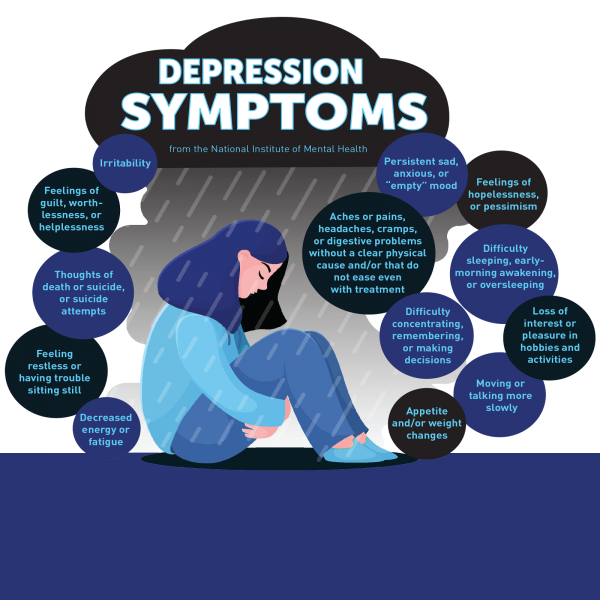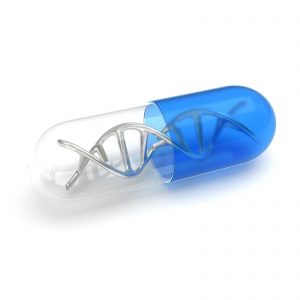
17.3 million adults in the United States went through at least one major depressive episode in 2017, according to the National Institute of Mental Health. With more than 7% of adult Americans dealing with major depression disorder annually, the odds are good that you or someone you know has first hand experience. The genetics of depression are heavily studied, and researchers have made important advancements toward better understanding and treatment.
Is depression inherited?
 As is often the case with genetics, the answer to whether depression is inherited is far more complex than just a yes or no. Research does point to a genetic component to depression, meaning that you certainly can, at very least, inherit a greater risk for depression.
As is often the case with genetics, the answer to whether depression is inherited is far more complex than just a yes or no. Research does point to a genetic component to depression, meaning that you certainly can, at very least, inherit a greater risk for depression.
The simplest representations of disease genetics suggest a single switch, on (healthy) or off (affected). There are diseases that work this way, where a single gene controls the presence or absence of a health issue. These are called Mendelian disorders. Many Intellectual or Developmental Disabilities (IDDs) are Mendelian disorders, as are cystic fibrosis and sickle cell anemia. Depression does not work this way.
Major depressive disorder is what geneticists call a “complex disease.” Complex diseases rely on a myriad of genes, as well as accompanying environmental factors. For example, you can be genetically predisposed to heart disease, but diet, exercise and stress levels still play a major role in whether you develop heart problems. In the same way, you can be genetically predisposed to depression, but personal health factors (diet, exercise, sleep) and environmental factors (upbringing, trauma, isolation) can also play a huge role in your health outcomes.
Understanding that there are genetic factors at play is still important, as it can make you more alert to symptoms when they appear. It can also help you make choices that support your mental and emotional well-being.
Do genetics affect the severity of depression?
Absolutely, genetics can affect the severity of depression, but it’s more complicated than strictly inheriting the severity from one or both parents. The scope and intensity of depression in patients associates with dozens if not hundreds of genes. Individuals inherit different combinations of risk factors, so there isn’t one primary predisposing genetic pathway. Here, we need a greater understanding of how complex diseases work on the genetic level to really grasp how genes impact depression.
In fact, one recent paper associated 102 different genetic variants with the molecular architecture of depression. That study incorporated results from more than 807,000 individuals (246,363 cases and 561,190 controls). The group that published the paper, the Major Depressive Disorder Working Group of the Psychiatric Genomics Consortium, confirmed 87 of the 102 variants by analyzing an independent replication sample from 1.3M individuals (414,055 cases and 892,299 controls). The scale of this study shows the enormity of datasets required for analyzing the genetics of complex disease. That’s, in large part, because of the genetic nature of the diseases themselves.
Instead of the ‘light switches’ we find with Mendelian disorders, you might be better off thinking about the genetics of complex diseases like depression as a mixing board in a recording studio. It’s not just whether a gene is ‘on’ or ‘off’. It’s also how ‘loud’ or ‘soft’ the gene is. If a gene is heavily over- or underexpressed, it can impact the function of an entire system.
 When determining the intensity of depression, you have to look at the entire mixing board to understand the sound you’re getting. There are dozens of genes expressed to varying degrees, and right alongside them, you find a number of environmental factors, all varying in intensity
When determining the intensity of depression, you have to look at the entire mixing board to understand the sound you’re getting. There are dozens of genes expressed to varying degrees, and right alongside them, you find a number of environmental factors, all varying in intensity
Can genetics help treat depression?
Treating depression proves particularly tricky, because every patient responds to the typical medications differently. Individuals with depression frequently move through several different drugs before they find one that alleviates their symptoms. Not everyone finds the answer that best suits them.
A 2018 article from Psychiatry Advisor outlines the concern:
A substantial number of patients (30% to 50%) do not respond adequately to their first antidepressant trial and only 37.5% achieve remission. Even those who respond often fail to remit or tend to relapse, which is a serious concern because remission is the “pathway to recovery from [major depressive disorder] (MDD).”
Moreover, it can take long periods of time, from several months to several years, of clinical trial and error before an effective, tolerable antidepressant is found for a particular patient. During this time, patients are exposed to ineffective medications with potential adverse effects as well as the harmful effects of depression itself.
Genetics could have a role helping with this challenge. A primary focus for integrating genetics into the clinical setting is developing ‘precision medicine’, where diagnoses and treatments are tailored for individual patients, often using genetic information.
As researchers continue to study, the goal is to more specifically classify depression based on genetic characteristics, hopefully providing information about which potential treatments might be effective. Genetic testing is also being developed as a tool for discovering which drugs a patient might best respond to.
 The Importance of Understanding
The Importance of Understanding
Understanding the wide variety of contributing factors to depression can give a more complete picture of the disease. For example, the large studies described earlier suggest neurons in key regions of the brain respond to stimuli in different ways in people with depression. However, we are still many years from completely identifying every genetic component involved. While we develop our genetic understanding, it’s important that we also remain understanding of the intensity of the experience for people who deal with depression symptoms every day. The molecular forces at play here hold many answers, but they will never be a substitute for kindness and empathy—both for those with depression as well as their loved ones.
Please, treat yourself and others well.
Many of you came to this post to learn more about the science of depression. However, if you found the post because you or a loved one are struggling, please consider using or sharing these resources. You are never alone and help is available.
- National Suicide Prevention Lifeline – You can reach the lifeline by calling 1-800-273-8255. It is a free, 24/7 service that can provide suicidal persons or those around them with support, information and local resources.
- Crisis Text Line – Text HOME to 741741 to have a confidential text conversation, available 24/7, with a trained crisis counselor from Crisis Text Line.
- For crisis support in Spanish, call 1-888-628-9454.
- For online chat, the National Suicide Prevention Lifeline provides a confidential chat service, with counselors available 24/7.
Get the Latest Sharable Science Delivered Straight to Your Inbox!
[gravityform id=19 title=false description=false ajax=true][wprpw_display_layout id=8]


